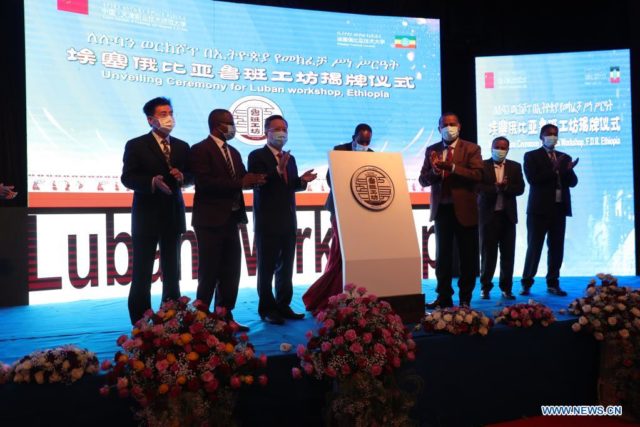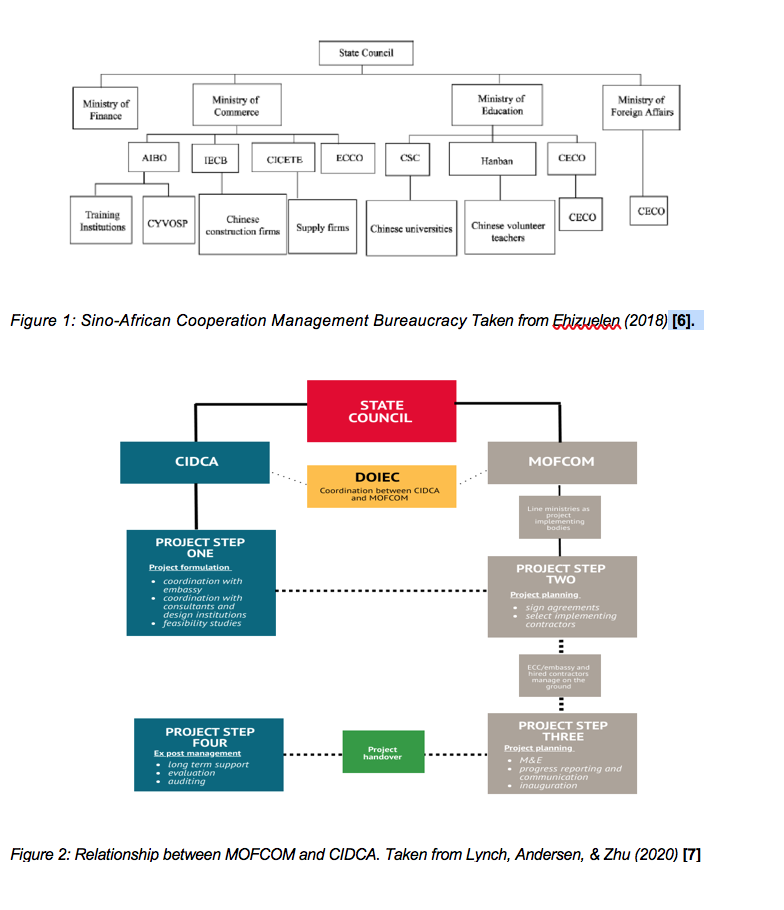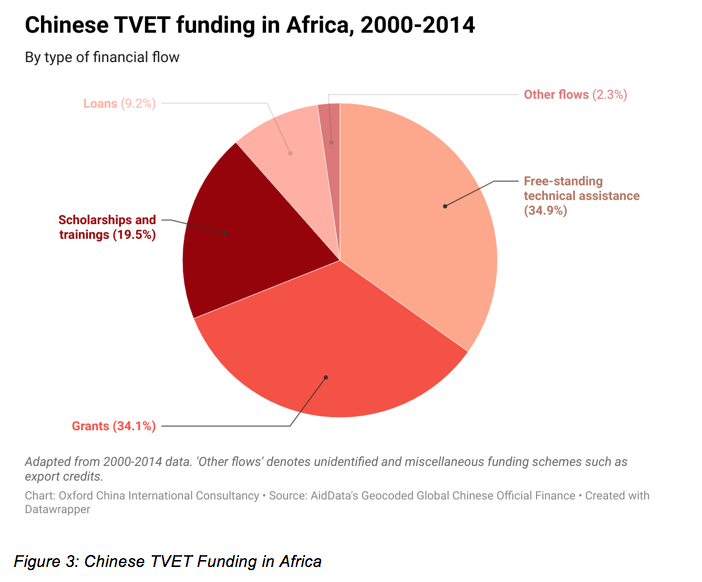
China’s Vocational Education Workshops Seek to Strengthen Relations with Africa
Publication: China Brief Volume: 21 Issue: 21
By:

Introduction
Over the past two decades, China has continuously increased its presence in, and cooperation with, countries across the African continent. The magnitude of increase in Chinese aid, can be seen by tracking the increase in China’s total Official Development Assistance (ODA) commitments to Africa, which jumped from $2.6 billion in 2000 to $37.3 billion in 2014 (AidData, 2019). At the 2018 Forum on China Africa Cooperation (FOCAC) summit in Beijing, Chinese President Xi Jinping delivered a keynote speech which stressed the importance of complementary development for China and Africa, stating: “China believes that the sure way to boost China-Africa cooperation is for both sides to leverage its respective strength; it is for China to complement Africa’s development through its own growth, and it is for both China and Africa to pursue win-win cooperation and common development” (Xinhua, September 3, 2018). In particular, China’s investment in Technical and Vocational Education and Training (TVET) efforts in Africa has steadily increased since 2000. Falling under the broad geopolitical agenda of the Belt and Road Initiative (BRI), China’s TVET programs in Africa seek to promote “win-win” cooperation that align Chinese business interests with individual African countries’ respective development conditions and goals.
Despite the COVID-19 pandemic, Chinese TVET efforts in Africa continued apace with the establishment of ten Luban Workshops from 2019 to 2021. Often described as the vocational and technical equivalent of Confucius Institutes, the Luban Workshops seek to train young African professionals with Chinese funding and cooperation (Global Times, September 3, 2018). Along with other TVET-focused education assistance, the Luban Workshops are a sign that disorganized Chinese training and education in support of its investment into Africa is becoming more targeted and organized. China’s growing presence in Africa has not escaped controversy, but perceptions of Chinese influence among citizens of African countries remain mostly favourable, with a continent-wide survey by indicating that 59% of respondents judged China’s influence to be “somewhat” or “very” positive, narrowly giving it the highest score of all external influencers (Afrobarometer, September 3, 2020). However, other studies have noted that there are complex variables which inform African perceptions of China; perceptions vary by country and are impacted by a range of factors such as relative national wealth of the target country, and the nature of Chinese projects in question [1].
Sino-African Cooperation and Skills Transfer
Historically, Sino-African collaboration has focused mostly on infrastructure, with railway, highway and energy projects attracting the most media attention. However, skills and education training is also a crucial area of Sino-African collaboration to monitor in terms of analyzing long-term benefits for China’s African partners. A fundamental assumption attached to foreign investment in Africa is it entails some kind of technological transfer opportunity for local citizens to be exposed to worthwhile labor opportunities, which generally happens in two ways. The first way to facilitate skills and technological transfers is by hiring local employees, and providing on the job guidance that allows them to learn from their colleagues.
Skills and knowledge can also be imparted through engagement with local communities’ educational institutions facilities through the provision of facilities, technical support, assistive technology, study-abroad opportunities, and so on. Some evidence indicates that China-funded projects in Africa countries have not generated adequate opportunities for work force development. African workers are mainly hired as low-skill, manual laborers, while managerial positions are disproportionately occupied by Chinese citizens [2]. The availability of local human capital to meet the technical demands of certain positions can certainly be called into question, but experts have also noted poor training practices, which have hindered the ability of locals to occupy higher-level positions in Chinese projects [3].
In an effort to develop local human capital in Africa, Sino-African educational and skills cooperation has become a more important area of collaboration over the past several decades, but has not received the same attention accorded to other areas of the relationship. There are a variety of frequently applied approaches to Sino-African collaboration on education and skills training, ranging from the provision of scholarships for African students to study in Chinese universities to building schools in African partner countries.
A variety of Chinese agencies play a significant role in Sino-African education cooperation. Figure 1 demonstrates the traditional decentralization of power within the bureaucracy, with different lines denoting ministries taking charge of various international portfolios. For much of the lifetime of Chinese TVET cooperation and the development of programming as a whole, the Ministry of Commerce (MOFCOM) was the most powerful stakeholder that controlled aid projects [4]. MOFCOM has its own Department of Foreign Aid and MOFCOM staffers that were transferred to staff Beijing’s new aid organ, the China International Development Cooperation Agency (CIDCA) [5]. Launched in 2018, CIDCA is still in the process of absorbing the responsibilities of other bureaucracies. As all this unfolds, Chinese TVET implementation will begin to reflect a more institutionalized aid bureaucracy.

Increasing Investment in TVET Skills and Education
China’s provision of scholarships to African students to study in China is perhaps the most well-known form of Sino-African educational cooperation. However, China has also made considerable efforts to improve in-country TVET initiatives within Africa as well. This is a part of the broader aim of ‘human resources development’ in Africa, which began around the year 2000 with the establishment of the African Human Resources Development Foundation and has since been strengthened through a range of training commitments made through the Forum on China-Africa Cooperation (FOCAC). From 2010 to 2012, 27,318 trainees from 54 different African nations were given training sessions. During this time, countries such as Kenya were the target of considerable TVET investment and assistance from China [8]. In Kenya alone, this has involved over $30 million in investment in activities such as equipping TVET institutions with adequate technology, providing training in how to install and use such technology, and providing instructor training for 15,000 Kenyan TVET personnel. Evidence derived from observing this kind of collaboration suggests that while it is not without flaws, the broad benefits of TVET cooperation significantly contributed to increased Kenyan capacity to work on key Chinese projects and benefited the reputation of Chinese investment among the Kenyan population [9].
An examination of a geocoded database on overseas Chinese finance from AidData reveals much about the scale and nature of Sino-African TVET cooperation. Just over 10 percent of all Chinese projects assessed by AidData include or are exclusively TVET initiatives. Of the nearly 400 instances of China’s international TVET cooperation since 2000, the lion’s share of projects – 70 percent – have taken place in Africa. Government-to-government grants, technical assistance, and ad hoc training or scholarships have been the main vehicles for TVET funding. In contrast, loans have been in the minority.

Luban Workshops Link Chinese Universities and Businesses with African Universities
In 2015, as part of the ‘10 major plans’ to boost Sino-Africa cooperation, Xi Jinping announced an initiative to establish local vocational education hubs to promote skills development in Africa. At the 2018 FOCAC, Xi called for the launch of eight China-Africa collaborative initiatives, among them sharing China’s “development practices with Africa and [supporting] cooperation with Africa on economic and social development planning” (Xinhua, September 3, 2018). These collaborative initiatives include the establishment of ten Luban Workshops, vocational education centers that have been set up across the African continent since Xi’s speech. The Luban Workshops seek to advance Xi’s stated goal of fostering “win-win” investment from China through specialized TVET workshops.
Luban Workshops not only are in line with China’s history of TVET funding in Africa, but also support China’s broader diplomatic and economic engagement with Africa. Indeed, Chinese and African politicians alike are heavily involved in the promotion of the workshops, lending legitimacy and diplomatic importance to the venture through the presence of African government officials and Chinese ambassadors to the nation. The 14th Five Year Plan, passed by China’s National People’s Congress in 2021, calls for the country to “deepen humanistic cooperation…between parliaments, political parties, and private organizations” from other countries (Xinhua, March 13). Under the banner of the Belt and Road Initiative, educational and developmental projects such as the Luban Workshops and other TVET investments will remain crucial elements of China’s aid outreach overseas. In each case, the Luban Workshops are the result of partnerships between universities in the city of Tianjin–noted in China as the “birthplace of vocational education” and home to some of the country’s earliest vocational universities (Exploring Tianjin). Additionally, the Luban Workshops occur in partnership with the Tianjin municipal government, local African universities, and in some cases, Chinese firms.
Table 1: List of Current Luban Workshops in Africa
| Country | Established | Local University Location | Chinese Partners | Curriculum Focus |
| Djibouti | March 2019 | Djibouti Industrial and Commercial School | China Civil Engineering Construction Group, Tianjin First School of Commerce, and Tianjin Railway Technical and Vocational College | Train railway managers and operators to help Djibouti expand its rail network
|
| Kenya | December 2019 | Machakos University | Tianjin City Vocational College, Huawei | Cloud computing, information security |
| South Africa | December 2019 | Durban University of Technology | Tianjin Vocational Institute | 3D printing, the internet of things |
| Mali | December 2019 | Bamako University of Science and Technology, and the University of Arts and Humanities of Bamako | Tianjin Medical College, Tianjin Red Star Vocational School | Traditional Chinese Medicine |
| Egypt | November 2020 | Ain Shams University and Cairo Advanced Maintenance Technical School | Tianjin Light Industry Vocational Technical College and Tianjin Transportation Technical College | Computer numerical control equipment application and maintenance, new energy application technology, and automobile application and maintenance technology, Chinese language |
| Nigeria | November 2020 | University of Abuja | Tianjin Sino-German University of Applied Sciences and Tianjin Railway Vocation and Technical College | Urban Rail Transit Traffic Management, Urban Rail Transit Vehicles, and Railway Bridges and Tunnels, electronics, power mechanisms, and telecommunications |
| Cote d’Ivoire | December 2020 | Institut National Polytechnique Felix Houphouet Boigny | Tianjin University of Technology | Mechanical and electrical engineering, automation |
| Uganda | December 2020 | Uganda Technical College-Elgon | Mbale Sino Uganda Industrial Park, the Tian Tang Group, Tianjin Polytechnic University | Urban Rail Transit Traffic Management, Urban Rail Transit Vehicles, and Railway Bridges and Tunnels |
| Madagascar | December 2020 | Higher Polytechnic Institute of Madagascar in Antananarivo | China Railway 18th Bureau Group, as well as Tianjin Vocational College of Mechanics and Electricity, Tianjin Machinery and Electric Industry School, and the University of Antananarivo | electrical engineering and automotive engineering |
| Ethiopia | April 2021 | Ethiopian Technical University | the Chinese Tianjin University of Technology and Education | industrial sensor technology, mechatronics technology, industrial control technology and industrial robotics technology |
Table data from: Tianjin.Chinadaily.com.cn, Beltandroad.news
China has moved forward with the Luban workshops despite COVID-19 related disruptions. In addition to fulfilling China’s goals of closer China-Africa ties through people-to-people links, each country’s workshop focuses on different technical skills in line with the host government’s respective development goals. Djibouti’s workshop will host Chinese professionals to train railway managers and operators through both in-class and practical on-site training as Djibouti expands its national railway network (China Daily, March 28, 2019). Ethiopia’s workshop, which teaches industrial sensor technology, mechatronics technology, industrial control technology and industrial robotics technology, is part of Ethiopia’s national goal to become an African manufacturing hub by 2025 (Xinhua, April 28, 2021). However, not every workshop focuses exclusively on hard technical skills: the Luban Workshop in Bamako, Mali focuses on Chinese medical training as an additional healthcare skill set for Malians. (China Africa Project, December 16, 2020).
The Luban Workshops are presented by Beijing as a good-faith effort, and have generally been received positively by China’s African partners. Muhammad Mujahid, Egypt’s Deputy Minister of Education for Technical Education Affairs, reported that these projects with China “will increase employment opportunities, open a new market to the graduates and provide jobs in modern fields” (Al-Monitor, May 26, 2021). Uganda’s Minister of Science, Technology and Innovations, Dr Elioda Tumwesigye, announced his belief that the Uganda workshop will enhance local and Africa-wide economies and enhance Ugandan technical talent (Daily Monitor, December 11 2020). Indeed, highly ranked African officials along with officials from the Luban Workshops’ Chinese partners usually preside over Luban Workshop opening ceremonies, indicating their importance to both parties. Nevertheless, the long-term impact of these programs remains to be seen. Since they are relatively new, collecting data on graduate employability and the longevity of the Africa-Tianjin relationship will be a task for the next few years as China’s TVET development model evolves.
In English language publications from the Chinese government and Chinese media outlets, the Luban Workshop Initiative is generally described as an altruistic policy to advance the infrastructural development of African nations and strengthen the diplomatic ties between China and Africa (Ministry of Education, May 31, 2019; China Daily, August 12, 2021). In articles outlining the Luban Workshops’ accomplishments since their establishment, the focus is often on the personal experiences, achievements and improved future perspectives of individual students at the workshops and how this impacts their country’s development (Ministry of Commerce, July 2). In addition to official news outlets, Chinese officials, organizations and embassies also use social media to inform the international public about the Luban workshops, usually emphasizing their role in increasing youth employment (Wu Peng, June 5,; Chinese Embassy in Uganda, December 11, 2020; Huawei Kenya, December 14, 2020). In a message congratulating the launch of the Luban Workshop in Ethiopia, Director-General Wu Peng from the Ministry of Foreign Affairs states that China “will further promote vocational education and boost youth employment in Africa” (Wu Peng, April 28). These overwhelmingly positive portrayals of the Luban Workshops in traditional and social media, therefore, indicate the initiative also includes an element of public diplomacy.
Conclusion
The Luban Workshop initiative provides a clear insight into what China would like Sino-African development cooperation to look like moving forward. China is fighting a challenging public relations battle on two fronts; winning the approval and trust of the African people and countering a growing narrative that Chinese intentions in Africa are not wholly positive. While some may argue that China may have little control over the latter, the former is certainly an area which China could benefit from making a priority. The poor perception of Chinese investment projects and their intentions are clearly something that impact Beijing’s ambitions in Africa. China has pulled out of investment projects in the past because of protests, a disconcerting issue for Beijing when one factors in the correlation between Chinese investment and popular protests in Africa and elsewhere (The Conversation, June 15; Reuters, February 18, 2020). Whether these protests were the product of poor practice or bad optics, it is clear that Chinese projects could benefit from a better perception. Visible projects like the Luban Workshops, which educate and train African students and raise the level of their involvement in Sino-African cooperation projects, could thus provide a positive boost to China’s image in African countries.
A third battle the Chinese government also faces in their ambitions on the African continent, which may present the greatest challenge of all, is a war of words over foreign investment and aid at home. Domestically, there are many who question the government’s commitment to the Belt and Road Initiative and do not share their optimism for creating a long-term, mutually beneficial trade relationship with their African partners. As Chinese businesses face crackdowns and growth continues to slow down, exorbitant foreign investment projects could draw more and more attention, and bad investments such as the infamous Hambantonta Port in Sri Lanka will be criticized even further. The clock may be ticking on China’s window to succeed in Africa, and in order to do so it must be proactive about investing in African people and the sustainability of their projects.
Conor McCutcheon is a graduate of the Yenching Academy, and has spent several years researching education and development in China.
Johnsen Romero is a Yenching Scholar and former public servant. He is a researcher for the Institute for Peace & Diplomacy.
Savannah Billman is a graduate of the Yenching Academy of Peking University. She is a Content Manager at China Admissions. She has written for The World Of Chinese, SupChina, and others.
Merle Kartscher is a Yenching Scholar at Peking University.
The authors are all members of the Beijing Branch of the Oxford China International Consultancy (OCIC). OCIC is a student-run consultancy group which aims to bring together people interested in China.
Notes
[1] Shahn M. Savino. “Friend or Foe: Perceptions of China in Africa.” (2018).
[2] Henry Tugendhat. “Connection issues: a study on the limitations of knowledge transfer in Huawei’s African training centres.” Journal of Chinese Economic and Business Studies (2021): 1-27.
[3] Tang Xiaoyang. “Does Chinese Employment Benefit Africans? Investigating Chinese Enterprises and their Operations in Africa.” African Studies Quarterly 16 (2016).
[4] Thomas Hale, Liu Chuyu, and Johannes Urpelainen. “Belt And Road Decision-Making In China and Recipient Countries: How and To What Extent Does Sustainability Matter?.” ISEP, BSG, and ClimateWorks Foundation (2020).
[5] Michael Mitchell Omoruyi Ehizuelen. “Education and skills development in China-Africa cooperation.” Frontiers of Education in China 13, no. 4 (2018): 553-600.
[6] Leah Lynch, Sharon Andersen, and Zhu Tianyu. China’s Foreign Aid: A Primer for Recipient Countries, Donors, and Aid Providers. Center for Global Development, 2020.
[7] Alexander W. Wiseman. Post-education-for-all and sustainable development paradigm: Structural changes with diversifying actors and norms. Emerald Group Publishing, 2016.
[8] Caroline M. Musyimi, Joseph Malechwanzi, and Luo Heng. “The Belt and Road Initiative and Technical and Vocational Education and Training (TVET) in Kenya: The Kenya-China TVET Project.” Frontiers of Education in China 13, no. 3 (2018): 346-374.




